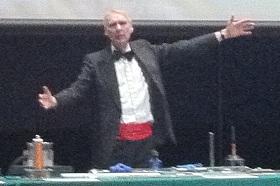Using AI to control energy for indoor agriculture
30 September 2024
Published online 17 May 2011

Over a thousand people, from the very young to the very old, packed a large auditorium yesterday at The American University in Cairo (AUC), Egypt, to watch The Wonders of Phsyics, a fast-paced extravaganza of physics experiments designed to get people excited about science.
Clint Sprott, an emeritus professor of physics at the University of Wisconsin–Madison, United States, wowed the crowd with his one-man show. Sporting a tuxedo, the showman presented all the elements of a magic show: tricks, puffs of smoke, loud explosions and a bed of nails.
"All these things are not magic though. These are the laws of physics," says Sprott.
The show is part of the Cairo Science Festival, a three-week outreach event to bring science to a wider audience. Lisa Anderson, president of the AUC, says the university wants to bring science out of the classroom and into the public realm.
Sprott gave several demonstrations through simple experiments. To show how air resistance worked, he dropped a coin and a piece of cotton inside a long glass cylinder, comparing the speed they fell before and after removing most of the air inside. He put a flame to a hydrogen-filled balloon to show how it is flammable and sucked a helium balloon to explain how sound waves propagate.
Each act was followed by a brief, simple explanation of the fundamental physics involved and why such things behave the way they do.
"This was really incredible, it is unlike anything I have ever seen before," a young girl in primary school told her mother on her way out after the show was over.
Sprott's call for willing volunteers during the show prompted dozens of hands to shoot into the air.
"The goal is not really to teach physics, but to convince people that physics is not boring, it is not difficult, that you can understand it, and that it is fun," says Sprott. "With the hope that, especially the children, as they get older will have a more positive feeling about physics and take a course in it."
That is why Ehab Abdel Rahman, a physicist at AUC invited Sprott. Abdel Rahman cites a falling interest in science as the reason behind an increase in science illiteracy in Egypt and the region over the past few years. "Given the importance of technological and scientific education, many believe there has never been a time when an understanding of science has been more important to the well-being of individuals and to Egypt than the present."
As science depends on evidence, the raucous rounds of applause throughout the event and the queues of photo hunters following the show were proof of the success of Sprott's show.
"I really enjoyed the show. All of us hated physics, but he displayed it in a nice way which actually made us like the field more and to appreciate how simple and funny nature can be," said Alyaa Abd El-fatah, a biotechnology student at Cairo University, after the event.
"I think all it is about is trying to generate a favourable image of physics, it is public relations really," adds Sprott.
doi:10.1038/nmiddleeast.2011.58
Stay connected: